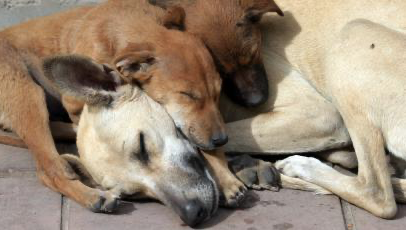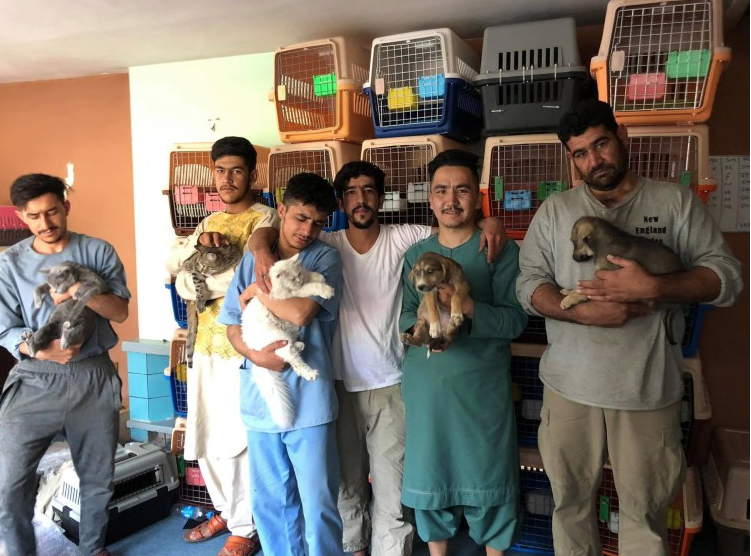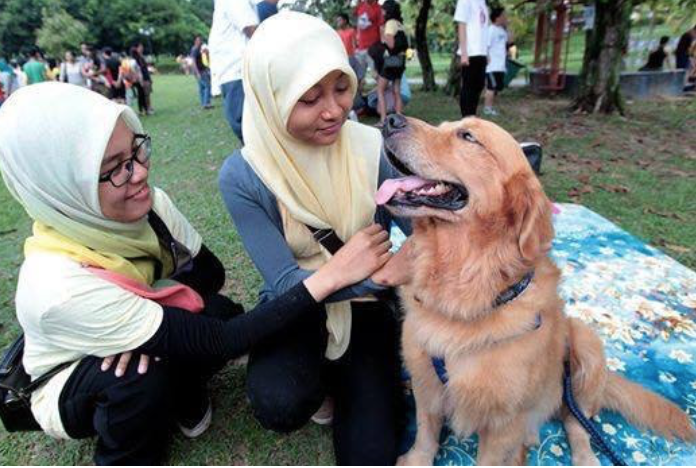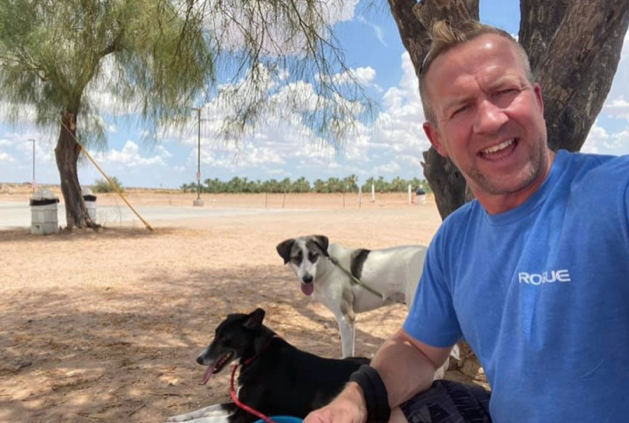CommentsANIMAL WATCH - Over three hundred rescued dogs and cats evacuated from war-torn Kabul, Afghanistan, arrived at the Vancouver International Airport in British Columbia, Canada, on February 1, 2022, to be reunited with owners or adopted to new homes, after a quarantine period, CBC News reported.
A total of 158 dogs and 146 cats in shelters and other care facilities in Kabul were left behind when U.S. President Biden announced in July 2021 that the U.S. was suddenly withdrawing its forces from the 20-year war in Afghanistan, according to the report.
Their arrival in Vancouver on Tuesday night was the result of more than six months of rescue efforts by the SPCA International and other U.S. organizations, including Animal Wellness Action, War Paws, Marley’s Mutts and Puppy Rescue Mission.
In a statement, the SPCA said numerous pets were left behind in shelters when their owners fled the country following the Taliban takeover.
A local charity, Kabul Small Animal Rescue (KSAR), had saved more than 70 dogs from Kabul International Airport and rescued dozens of other animals abandoned by owners when they were forced to flee.
Some of the obstacles that stood in the way of the international rescue effort included plane restrictions, explosions at the Kabul airport, and permit delays.
Some of the animals were left with the Kabul Small Animal Rescue by owners who could not obtain permission for them to enter other countries at that time due to disease-control restrictions, reports stated.
"These animals have been on the plane for quite some time," Lori Kalef, director of programs for SPCA International told reporters. "We had to reroute at the last minute due to the conflict going on in Russia.”
The animals will be transferred to a specially constructed facility in Canada for the required rabies quarantine period.
The CBC (British Columbia) first announced on July 1 that a Russian plane specially converted by SPCA International for animal air-transport will make stops in Turkey and Iceland. before its touchdown at Vancouver International Airport (YVR).
SPCA International said they were responding to the pleas of partners in Kabul to remove the animals to safety in the U.S.; however, the highly volatile political condition at the time and the current conflict with Russia had necessitated the delay.
The animals had to be taken to Canada because of the strict restriction on imports by the Centers for Disease Control (CDC) due to recent cases of rabies in the U.S. The disease-control regulations, specifically around vulnerable animals at high risk of rabies, also meant that some of the dogs being rescued could not be flown directly into the country.
Len Kalef, who was in charge of the operation as director of programs for SPCA International said that “about 66 of the animals will be reunited with their owners, while another two dozen will stay with the SPCA until they are able to be reunited with their owners.
The others will be put up for adoption across North America.
Anyone interested in adopting one of the animals can visit the SPCA International website. Applications will be handled by SPCA International and the B.C.-based RainCoast Dog Rescue Society.

THREATS TO ANIMAL RESCUE ORGANIZATIONS IN KABUL
Two rescue groups in Kabul had hoped the animals would be flown out of the country immediately, but Paul “Pen” Farthing of the UK, who ran Nowzad Animal Sanctuary, and Charlotte Maxwell-Jones from the U.S., who heads the Kabul Small Animal Rescue, found their options for transporting the animals out of Kabul or leaving the country with animals (and staff) differed.
On August 26, Farthing, founder of the Nowzad Animal Sanctuary in Afghanistan, and a former British Royal Marine, told NBC he was worried about the safety of his 25 Afghan staff members, including three of Afghanistan's first female veterinarians.
He vowed not to leave Afghanistan without them.
"My staff don't deserve the fate that awaits them if they stay here in Afghanistan," he told Reuters in an interview from Kabul.
"I had an opportunity, the fact that I am a British citizen, I'm going to use that to full effect—so I've said I'm not going until my staff leaves this country.”
However, the British government say things differently.
TALIBAN TOOK CONTROL OF KABUL AIRPORT
The Taliban took control of the Kabul airport Aug. 31, while military-contract dogs remained. Charlotte Maxwell-Jones, the director and founder of Kabul Small Animal Rescue in Afghanistan, where she has lived for 11 years, said she refused opportunities to escape in an effort to save the dogs left behind during the hasty American withdrawal.
She told Fox8Live she was staying behind until roughly 130 dogs, about 50 of which are military contract dogs, are safely evacuated.
“They’re my responsibility and I love them and I care for them. I think there’s a less chance of recovering them if I’m not here,” said Maxwell-Jones. of Kabul Small Animal Rescue.
GardaWorld, a military contractor, confirmed to the Military Times on Tuesday that it had dogs in Kabul but did not specify how many. It said it would work with Kabul Small Animal Rescue to continue evacuation efforts despite “grueling” setbacks.
“Our team has worked relentlessly with numerous dedicated charities to rescue our dogs and all the animals under KSAR’s care,” GardaWorld said in a statement to the Military Times.
Biden said in an address Tuesday, August 31, that an estimated 100 to 200 Americans remain in Afghanistan. He characterized them as mostly dual citizens who are longtime Afghanistan residents and have not left because of family connections.
“That was the choice, the real choice—between leaving and escalating,” Biden said. “I was not going to extend this forever war, and I was not extending a forever exit.”
KABUL SMALL ANIMAL RESCUE AND THE MILITARY-CONTRACT DOGS
The Kabul Small Animal Rescue was started in 2018 by Charlotte Maxwell-Jones, an American. She acknowledged in a recent interview with the outlet Stars and Stripes that evacuating the rescue’s dogs and staff was a daunting mission.
While the group had raised significant money to fund private flights, Stars and Stripes reported, the “biggest hurdle is finding a third country that will allow a plane carrying animals to land” in order to allow Afghan staffers to be vetted before entering the U.S.

There was serious concern about the military contract dogs that were reportedly left at the airport when U.S. forces exited. These dogs were reportedly taken in by Kabul Small Animal Rescue and are included in the dogs that were evacuated.
Maxwell-Jones told WVLT News that military contract dogs, like working dogs owned by the military, are trained to sniff bombs and perform crucial tasks to help neutralize threats for U.S. troops while overseas.
The main difference between a contract dog and a military dog is who owns it. According to Department of Defense spokesperson Eric Pahon, contract dogs are hired from outside companies to do work for the military, but the military does not own them. However, he did confirm that the Department has worked with Kabul Small Animal Rescue to move the contract dogs into a safer, fenced area.
Pahon explained to WVLT News why the U.S. government could not evacuate these dogs. “Since the military does not own the contract animals or have access to their health records, they must take charter flights, not military ones, out of the country.”
NOWZAD ANIMAL RESCUE FORCED TO LEAVE STAFF BEHIND
Other rescued animals were caught up in the Afghan withdrawal. Nowzad director, Paul “Pen” Farthing, making global headlines tried to leave the country with dozens of rescue cats and dogs in an evacuation mission dubbed “Operation Ark.” Farthing landed in Britain on Sunday, but he has faced criticism for evacuating without the charity’s human staff.
Farthing, 57, desperately tried to fly out over 100 animals—94 dogs and 79 cats, which had been moved from the charity’s three locations to Kabul and keep his promise to remove dozens of workers before the evacuation deadline, according to the New York Post.
He, said Nowzad had raised enough money to pay for a cargo plane out of Kabul, including his entire staff—but British officials said there are “thousands and thousands” of people who need to be prioritized first.
He also wanted to use the plane to evacuate 68 Afghan refugees, including workers, who are at his shelter, the report said, “We want to bring in an aircraft with 250 seats and we need only 69 of them.
However, British Defence Secretary Ben Wallace told the BBC, “Thousands and thousands of people, some of whom are under really, really direct threat, very dangerous threat because of what they did during the last 20 years, and they have a right to get on a plane as much as anyone else.”
“So therefore our priority is getting those people processed and I simply can’t push those people out of the way to allow through some of those other cases,” the defense secretary stated.
"My staff don't deserve the fate that awaits them if they stay here in Afghanistan," he told Reuters in an interview from Kabul.
However, Nowzad confirmed he and his animals left the country on Saturday as they were caught up in Thursday's Kabul airport bomb blasts. He was forced to leave his staff behind.
His plane landed at Heathrow Airport on Sunday morning, He said on Twitter he had "true deep feeling of sadness for Afghan today.”
But Defence Secretary Ben Wallace has complained some of Mr Farthing's supporters had "taken up too much time of my senior commanders dealing with this issue when they should be focused on dealing with the humanitarian crisis."
Pen Farthing said, "Twice today I've had an AK poked in my face." In a post on Sunday afternoon, Mr Farthing said he arrived at Heathrow with a "partial success" of Operation Ark.
But speaking to LBC on Saturday, Foreign Affairs Select Committee chair Tom Tugendhat said: "The difficulty is getting people into and out of the airport and we've just used a lot of troops to bring in 200 dogs, meanwhile my interpreter's family are likely to be killed.
"As one interpreter asked me a few days ago 'why is my five-year-old worth less than your dog?', he added.
On Friday, Mr. Farthing and his animals were assisted by the UK Armed Forces through Kabul Airport, as he said, “Our thoughts for now are with our staff and the many people and animals who have also been left behind. We will do our utmost to help them," the BBC reported.
KABUL’S STREET DOGS – AND OTHER VICTIMS OF THE WAR
“In Kabul’s Streets, Dogs Rule the Night,” the New York Times explained on March 21, 2021, that most of the dogs in Kabul were not the topic of mass evacuations or any outside consideration at the end of the war—or at any other time.
In fact, the packs of stray dogs that roam the streets after dark have become such a part of the landscape that they are unnoticed by officials unless they come in conflict with each other or a human as they compete with criminals for survival during the night. This article gives insight into the impact of the war and the Covid era on businesses and the resulting spike in crime and hungry dogs.
The packs of dogs that gather on the corners and dark areas by streets at night are described as appearing to be “a cross between a shepherd and a Labrador and are small in stature compared with the hulking ones that are used often for fighting in the country. The strays live among piles of trash, at the end of street alleys, near restaurants where they can scavenge for food.”
Although there is concerted effort by the government to fight rabies by vaccination campaigns, one of the shop owners told reporters that, “The government and the police, they do what they can, but they don’t have the capacity to fight dogs, terrorists and thieves.”
THE HISTORY OF DOGS IN THE MUSLIM RELIGION
Dogs have played various roles in Muslim countries, based upon the acceptance by the religious leaders and practicality and usefulness they served.
An ABC Radio International report is entitled, “Is it OK to pat a dog?”

The discussion begins, “For some Muslims, anxiety upon arrival in Australia derives less from a concern about encountering local authorities and more from a deep-seated fear of dogs.”
Dr Raihan Ismail explains that followers of the Shafi'i school of jurisprudence in Sunni Islam, are taught that dogs are unclean and impure, and “If they touch a dog they must wash the area of contact seven times—the first time with dirt and the remaining six times with water.”
He adds that this ruling is based on a second-hand account of the sayings of the Prophet Muhammad, and the belief that, if the person fails to do so, their prayers are rendered invalid. He adds that, “These rules also extend to clothes, dishes and other items with which dogs have contact.”
Syed Azmi Alhabshi, a Muslim-Malaysian pharmacist, is among the people encouraging more compassion towards dogs.
However, in 2014 an organized movement was begun to encourage more compassion toward dogs, he states, and an event called, “I Want to Touch a Dog," was held in a large shopping mall in Kuala Lumpur and attended by more than 600 people. Two-hundred volunteers brought dogs, including poodles, golden retrievers and German shepherds.
This effort was severely rebuked by many Muslim religious leaders and the debate about whether dogs can be kept as pets continues and, an increasing number of Muslims claim publicly that pets are part of their family.
Although this debate is far from over, an Economist article, “Are Dogs Acceptable Pets?” on August 27, 2021, states that “This month Egypt’s grand mufti, Shawki Allam, weighed in on the side of man’s best friend.” Whereas some interpretations of Islam deem dogs impure, Mr Allam says: “It is possible to coexist with a dog and still worship God.” Citing the Maliki school of Islam, he claims that every living animal is pure.”
Certainly that conveys the conviction of the rescuers who went to Kabul during the war to help the animals they could and have fought to assure that the dogs that have just been transported from the war-ravaged area of Kabul were taken in and protected.
It also supports the hope of America that publicity regarding this effort and recognition of the dire conditions from which these dogs were rescued is a beginning step toward greater awareness, compassion and better lives for the future generations of those left behind.
For a moment of inspiration and hope, view the Facebook page of Kabul Small Animal Rescue here.
(Phyllis M. Daugherty is a contributor to CityWatch and a former Los Angeles City employee.)
